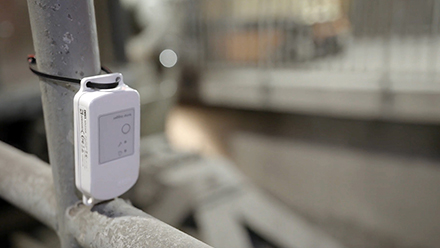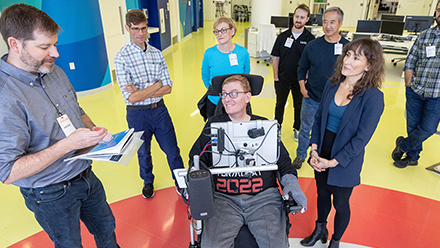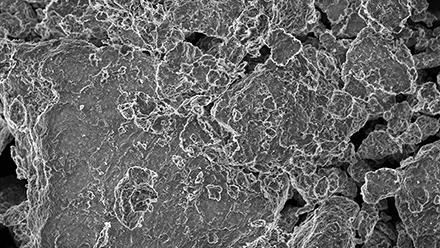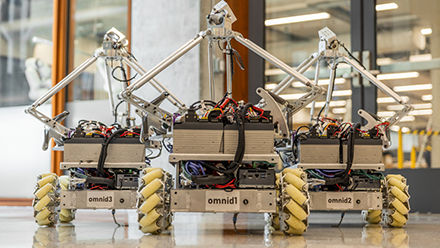
The Ground Is Deforming, and Buildings Aren't Ready
Research uses sensor network to quantify effects of subsurface climate change on civil infrastructure.
Alessandro Rotta Loria - CEE

We're tackling the grand challenges of today and tomorrow with a distinctly Northwestern mindset.
The grand challenges we face today are obvious: Tackling climate change. Exploring space travel. Maximizing artificial intelligence. Eradicating disease.
Equipped with future methods of engineering and an educational skill set rooted in whole-brain thinking, we will use our expertise to approach these problems in uniquely targeted ways to make the greatest possible impact.
AI meets the physical world, interacting with and learning from its environment
Leveraging strengths in robotics, AI and machine learning, and sensor networks, we will maximize AI's impact in the physical world by designing sensor-actuator and mechanical systems that can be embedded within complex networks - from the power grid to autonomous vehicles to smart factories.

Research uses sensor network to quantify effects of subsurface climate change on civil infrastructure.
Alessandro Rotta Loria - CEE

Project Drive aims to bring to market first active driving assistance system for power wheelchairs, increasing access to safe, independent operation.
Brenna Argall - ME, CS

Interdisciplinary engineering team developed a wearable fatigue-prediction sensor system.
Ping Guo - ME
Qi Zhu - ECE
Mitigate harm and decarbonize the future
If the twentieth century challenged engineers to make cities livable, the twenty-first century has challenged us to make those same communities sustainable and also adaptive to extreme weather events. By connecting sustainability, urban environments, and equitable climate technologies, Northwestern engineers will not only help decarbonize the earth but will also help mitigate the effects of climate change on people and communities. We will build, preserve, and restore systems to support human activities and minimize our footprint on nature.

CEE experts reimagine how hundreds of diplomatic locations around the world can prepare for climate change.
Kimberly Gray - CEE

Research explains explain how soil sequesters plant-based carbon from the atmosphere.
Ludmilla Aristilde - CEE

Zero liquid discharge technologies can ease water scarcity but at increased cost and energy consumption.
Jennifer Dunn - ChBE
From space to deep sea and beyond, enable new technologies in harsh environments
Surviving and thriving in the harshest environments - on Earth or elsewhere in the solar system - will require specialized devices, infrastructure, and communication systems optimized for these unique conditions. Northwestern leads in developing the materials and technology to support these endeavors.
Our civil and environmental engineers are working with materials scientists, mechanical engineers, chemical engineers, and chemists to devise the foundational components to support human settlements in the most severe environments. Their work is dual-purposed: the same materials and methods used to build habitats on Mars, for example, could also help rapidly produce housing in areas hit by natural disasters on Earth.
But our work doesn't stop there. We're also studying the optimal team dynamics to support successful work within these environments.

The student group explored expandable technology for lunar structures.
Ian McCue - MSE
Ryan Truby - MSE, ME

New mobile "mocobots" could signal new era of human-robot interaction in construction and space exploration.
Kevin Lynch - ME

A new idea among a rich history of proposals to make the surface of the cold planet habitable
Hooman Mohseni - ECE
Improve the quality of life, not just longevity
Engineering and technology can do more than simply cure disease or extend life. Technologies that interact with the human body and optimize health will advance and translate biomedical research to maximize human well-being and improve quality of life. We will explore innovative technologies that could change how the human body responds to disease and heals from injury as well as improve short- and long-term health outcomes.

Minimally invasive implant will eliminate the need for injections and deliver medicine on demand.
Jonathan Rivnay - BME, MSE
Josh Leonard - ChBE

Implantable device works like a tree branch to grab and fling proteins.
Shana O. Kelley - ChBE

Thin, flexible device gently adheres to the skin, providing more realistic and immersive sensory experiences.
John Rogers - MSE, BME
Yonggang Huang - ME, CEE